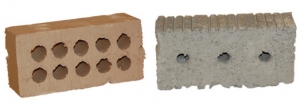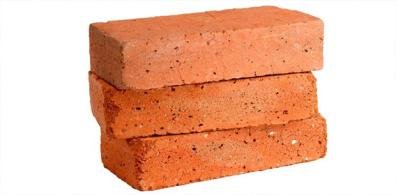
..............................................................................................................................................................
engineeringinsider.org
There are different types
of bricks are used in masonry construction materials as clay, concrete, lime,
fly ash etc.
Brick is an important
construction material which comes in rectangular shape made from clay.
The brick is as popular in
older days and as modern days as it has low cost and durability.
Types of Bricks used in
Masonry Construction
(1) Sun-Dried or Unburnt
bricks
(2) Burnt bricks
Sun-Dried or Unburnt Clay
Bricks
The Sun-dried or unburnt
bricks are less durable and used for temporary structures. There are three
mainly three steps for manufactures are clay, moulding and drying.
After moulding process the
bricks are left to dry from direct sunlight.
The sun-dried bricks are
not much strong and also less water and fire resistance. These bricks are not
suitable for permanent structures.
Burnt Clay Bricks
Burnt bricks are widely
used brick but during manufacturing some bricks are damaged. These bricks are
divided into four types
Second class brick
Third class brick
Fourth class brick
First Class Brick
Fist class bricks have good
quality than other types of bricks. These bricks are moulded into
table-moulding and burnt in large kilns.
As the result these bricks
have standard shapes, sharp edges and have smooth surface.
These bricks are more
durable and have more strength.
The first class bricks are
used for permanent structures. These bricks are costlier than other classes due
to good qualities.
Second Class Brick
As the name suggests these
bricks are moderate quality bricks moulded with ground-moulding process.
These bricks are burnt in
kilns. As the ground moulding process is used they don’t have smooth surface
and edges.
The shape of bricks is also
uneven as it mould on ground. These bricks have strength and durability. For
smooth finishing the plastering is required.
Third Class Brick
Third class bricks are used
in temporary structures as they have poor quality. These bricks are not suitable
for rainy areas.
These bricks are
ground-moulded and burnt in clamps. The bricks have rough surface and edges are
not proper.
Fourth Class Bricks
Fourth class bricks have
poor quality and not used for construction. These bricks are crushed and used
as aggregates for making of concrete.
The bricks which are
over-burnt and due to this these bricks are brittle. These bricks are easily
breakable and not suitable for construction.
Fly Ash Bricks
Fly ash bricks are made
using fly ash and water.
The fly ash bricks have
better properties than clay bricks and resistant to freeze thaw cycles.
These bricks have high
concentration of calcium oxide which is used in cement production and due to
this it is called self-cementing brick.
The fly ash bricks are
lightweight and it reduces the weight of structure fly ash brick making
machine.
Fly ash bricks are better
than clay bricks as they have high fire insulation, high strength, uniform
sizes for better joints and plaster, lower water penetration and does not
require soaking in water before masonry construction fly ash brick machine
manufacturers.
Concrete Bricks
Concrete bricks are
manufactured using cement, sand, coarse aggregates and water. These bricks are
manufactured in various required sizes.
Concrete bricks have
advantages over clay bricks as they can be manufacture at construction site,
required less mortar, can produce in different colours as adding pigments
during production concrete block making machine.
The concrete bricks are
used in construction of masonry and framed buildings, facades, fences and also
provide an excellent look of building.
Engineering Bricks
Engineering bricks have
high compressive strength and used for applications like strength, frost
resistance, acid resistance, low porosity is required.
Engineering bricks are
commonly used for basements where chemical and water attacks are prevalent and
for damp proof courses.
Sand Lime or Calcium
Silicate Bricks
A calcium silicate brick is
made from sand and lime and it is known as sand lime bricks.
Sand lime bricks are used
for various purposes in construction industries like decoration works in
building, masonry works etc.
Quality of Bricks at
Construction Site
To build any structure, the
material is quality should be good. Here is the list for how good bricks are
identified at construction site.
– The
colour of bricks should be bright and uniform.
– The bricks
should be well burned and have smooth surface and sharp edges.
– Thermal
conductivity should be less and also sound proof.
– Bricks
should not absorb more than 20% of weight when soak in water.
– When
two bricks impinge together, the ringing sound must be produce.
– The
brick structure must be uniform.
– Bricks
should not be break when dropped from 1m height.
– There
should be not any scratch when scratch with finger nail.
– There
should not be any white deposit on brick after soak in water for 24 hours.
Properties of Bricks
Below properties should be
in brick for construction use.
– Hardness
– Compressive Strength
– Absorption
Hardness of Bricks
A brick has resistance
against abrasion. This hardness of brick gives permanent nature of brick
structure. Due to this property bricks are not damaged by scraping.
Compressive strength of
Bricks
Compressive strength or
crushing strength is property of brick which means the load carried by brick
per unit area.
As per rule of BIS minimum
compressive strength of brick should be 3.5N/mm2. The crushing strength of
bricks reduced when they are soaked in water.
Crushing strength of
Bricks Grades
7 – 14
N/mm2 Class A
>14N/mm2 Class
AA
Absorption of Bricks
Bricks generally absorb
water but in limit. The absorption limit percentage by weight for different
types is in below table.
Class of
Bricks Water Absorption % by weight
Heavy duty bricks (special
made) Only 5%
First class 20%
Second class 22%
Third class 25%
Use of different types of
Brick
– 1st and
2nd class bricks are used in construction of building, tunnels, pitching works
etc.
– 3rd
class and unburnt bricks are used in temporary structures.
– 4th
class bricks are used as aggregate for making concrete.
– Bricks
are also used to enhance the beauty of structures.



No comments:
Post a Comment